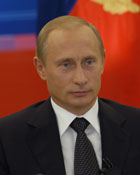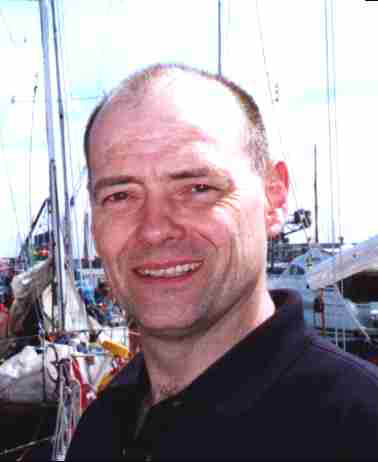|
The
G8 comprises seven of the world's leading industrialised
nations, and Russia.
The
leaders of these countries meet face-to-face at an
annual summit that has become a focus of media attention
and protest action.

Vladimir
Putin
President
of The
Russian Federation
Term of Office: 31 December 1999 - Present
Date of birth: 7 October, 1952
Place of birth: Leningrad, Russia
Education:
|
|
|
|
|
Degree
in Law, Leningrad State University, Russia
|
|
|
Elected
President of Russia
|
|
|
Acting
President of Russia
|
|
|
|
|
|
Director
of the Federal Security Service and
Secretary of the Security Council
|
|
|
Director
of the Federal Security Service
|
|
|
Deputy
head of the Presidential Administration
and head of the Central Supervision and
Inspections Directorate
|
|
|
Deputy
head of the President's Property
Management Directorate
|
|
|
Chairman
of the St. Petersburg City Council’s
International Relations and First
Deputy Chairman of the St. Petersburg City
Government (First Deputy Mayor).
|
|
|
Assistant
to the rector of Leningrad State
University, where he was responsible for
international affairs
|
|
|
Advisor
to the chairman of the Leningrad City
Council
|
|
|
|
ABOUT RUSSIA:
The Russian Federation will hold the G8 Presidency
for the first time in 2006.
Full Country Name: The Russian Federation
Area: 17,075,400 square kilometres (76% of
former USSR)
Population: 145,000,000 (June 1999)
Capital City: Moscow
Official Language(s): Russian
Currency: 1 Rouble = 100 Kopeks
People: 82% Russians (but in all more than
100 nationalities)
Head of State: President Vladimir
Putin
Prime Minister/Premier: Mikhail Fradkov
Foreign Minister: Sergey Lavrov
GEOGRAPHY
Russia is the largest country in the world, spanning
11 time zones. The landscape varies widely, from
vast open tracts in the European heartlands and the
taiga and tundra of Siberia, to mountainous terrain.
ECONOMY
GDP per head (PPP): US$ 9,230 (2003)
Inflation: 12% (2003)
POLITICS
Vladimir Putin was formally elected President on 26
March 2000. President Putin won a second term
in March 2004.
Leaders
of G8 countries aim to:
Boost
cooperation over trade and finance
Strengthen
the global economy
Promote
peace and democracy
Prevent
and resolve conflicts

Nelson
Kruschandl - "Well done on famine relief - what
about global warming?"
OVERVIEW
The
G8's roots lie in the oil crisis and global economic
recession of the early 1970s. In 1973, these challenges
prompted the US to form the Library Group - an informal
gathering of senior financial officials from Europe,
Japan and the US.
At
the instigation of the French, the 1975 meeting drew in
heads of government. The delegates agreed to meet
annually. The six nations involved became known as the
G6, and later the G7 and G8 after the respective entries
of Canada (1976) and Russia (1998).
Initially
set up as a forum for economic and trade matters,
politics crept onto the G7 agenda in the late 1970s.
Issues under consideration at recent summits have
included helping the developing world, global security,
Middle East peace and Iraq reconstruction.
G8
members can agree on policies and can set objectives,
but compliance with these is entirely voluntary. The G8
has clout in other world bodies by virtue of the
economic and political muscle of its members.
The
workings of the G8 are a far cry from the "fireside
chats" of the Library Group in the 1970s. Holed up
behind fortress-like security, the delegates are
accompanied by an army of officials. Elaborate
preparations are made for their meetings, statements and
photo-calls.
Nevertheless,
G8 leaders strive to keep at least some of their
encounters free from bureaucracy and ceremony. On the
second day of their summit the leaders gather for an
informal retreat, where they can talk without being
encumbered by officials or the media.
The
European Union is represented at the G8 by the president
of the European Commission and by the leader of the
country that holds the EU presidency. The EU does not
take part in G8 political discussions.
FACTS
-
Founded:
1975, Rambouillet, France
-
Original
members: France, Germany, Italy, Japan, UK, US
-
Later
members: Canada (joined at 1976 summit, San
Juan, Puerto Rico), Russia (joined at 1998 summit,
Birmingham, UK)
LEADERS
The
presidency of the G8 rotates between the group's member
nations on an annual basis.
The country holding the presidency in a given year is
also responsible for hosting the annual summit, and for
handling the security arrangements. As the
foremost economic and political power in the G8, the US
is regarded as the dominant member of the group,
although this position is not formally enshrined.
ISSUES
Critics
of the G8 have accused the body of representing the
interests of an elite group of industrialised nations,
to the detriment of the needs of the wider world.
Key countries with fast-growing economies and large
populations, including China and India, are not
represented. There are no African or Latin American
members. The G8's positive stance on globalisation
has provoked a vigorous response from opponents, and
riots have sometimes overshadowed summit agendas, most
notably in Italy in 2001.
The
violence has encouraged a tightening of the security
cordon that separates protesters and politicians,
reinforcing the G8's closed-door image. In recent
years the G8 has launched drives to counter disease,
including HIV-Aids, and has announced development
programmes and debt-relief schemes. But aid is often
dependent on the respect for democracy and good
governance in the recipient countries. Critics say that
spending on such initiatives is inadequate.
Basic
disagreements sometimes emerge within the G8: Global
warming was a sticking point at the 2001 Genoa summit,
where US President George W Bush underlined his
rejection of the Kyoto treaty on emissions. Rifts among
G8 members have also been evident over the US-led war in
Iraq.
Background
| The
summit agenda | Venue
| Participants
| Local
Impact
Local
Security
| Insurance
Cover | Business
Opportunities | Glossary
Publications
| Africa
| Climate
Change | Frequently
Asked Questions
What
is the G8 Summit?
| About
G8 Tartan
The
G8 leaders
2001:
Italy (Genoa summit)
2002:
Canada (Kananaskis summit)
2003:
France (Evian summit)
2004:
US (Sea Island summit)
2005:
UK (Gleneagles summit)
Global
Warming
| Waste
Recycling | Climate
Change
MORE
ON AGENDA 21
MEMBERS
OF PARLIAMENT A-Z HOUSE
OF LORDS A-Z COUNCIL'S
AGENDA 21
BBC
Links
Aminata's
hopes
A
delegate at the youth equivalent of G8 shares her
thoughts
Africa
Links
Climate Change Links
Other G8 Summit websites
Britain and Scotland
UK Government
Youth events in 2005
linked to key G8 themes of Africa and Climate Change
Additional Links

Tony
Blair - promises like piecrust
Tony
Blair has also signaled a shift away from legally
binding targets key to tackling climate change. Please
e-mail your MP to urge Tony Blair not to turn his back
on climate change. Visit our information
page to find out more.
Dr
Ashok Sinha, Director of Stop Climate Chaos, said
"Tony Blair’s recent remarks on climate change
are giving Kyoto’s opponents - in particular President
Bush - the ammunition to kill off the Protocol.
For a Prime Minister who has championed climate change
throughout his EU and G8 Presidencies Tony Blair is now
in real danger of undermining the most important climate
change agreement ever."

President
Bush loves oil - Watch
"Climate Mash"
ACT
NOW: Ask
your MP to urge Tony Blair not to turn his back on
climate change (90 seconds is all it takes).
Or
read
more first Thank you for your support - the
Climate Change Campaign Team
CLIMATE
CHANGE: RELATED STORIES
|
|
 |
"The
Climate Mash" is hilarious, but the effects of
global warming aren't funny.
Global
warming puts our health, our economy and our environment
at risk. It's time to demand that major polluters like
ExxonMobil and others stop resisting solutions that
could make a real difference.
Your
voice is needed to overcome the polluters who are trying
to bury clean energy solutions. NOW is the time to tell
your elected representatives in Washington that you want
their commitment to solving global warming.
More
Climate Mash Stuff!
For
The News Media
For
the Fans
Credits
-
"Climate
Mash"
performed by Bobby
"Boris" Pickett
-
Music
and backup vocals by Andrea
Perry
-
Bush
voice by Austin comic Kerry Awn
-
Flash
animation by Horseback
Salad
-
Lyrics
and script written by Peter Altman
-
"Monster
Mash" song:
"Monster
Mash"
Words and Music by Bobby Pickett and Leonard Capizzi
Copyright © 1973 Dimensional Music Publishing LLC.
d/b/a Acoustic Music (BMI)/
Gary S. Paxton Publications, Inc. (BMI) / Capizzi
Music Co. (BMI)
Worldwide rights for Acoustic Music and Gary S.
Paxton Publications, Inc.
administered by Cherry River Music Co. (BMI)
All Rights Reserved - Used By Kind Permission
Climate
change is a global challenge and requires a global
solution
Greenhouse
gas emissions have the same impact on the atmosphere
whether they originate in Washington, London or Beijing. Consequently,
action by one country to reduce emissions will do little
to slow global warming unless other countries act as
well. Ultimately, an effective strategy will
require commitments and action by all the major emitting
countries.
The
international response to climate change was launched in
1992, at the Earth Summit in Rio de Janeiro, with the
signing of the United Nations
Framework Convention on Climate Change (UNFCCC).
The Convention established a long-term objective of
stabilizing greenhouse gas concentrations in the
atmosphere "at a level that would prevent dangerous
anthropogenic interference with the climate
system". It also set a voluntary goal of reducing
emissions from developed countries to 1990 levels by
2000 - a goal that most countries did not meet.
Recognizing
that stronger action was needed, countries negotiated
the 1997 Kyoto
Protocol, which sets binding targets to reduce
emissions 5.2 percent below 1990 levels by 2012. The
Protocol entered into force on February 16, 2005, which
made the Protocol's emissions targets binding legal
commitments for those industrialized countries that
ratified it (the United States and Australia have not
ratified it). In addition, the market-based mechanisms
established under the Protocol, including international
emissions trading and the Clean Development Mechanism,
became fully operational with the Protocol's entry into
force.

CONTACTS:
UK
Environment Agency
Phone: (011)00-44-1709-389-201
Greater
London Authority
Phone: (011)020-7983-4000
|





